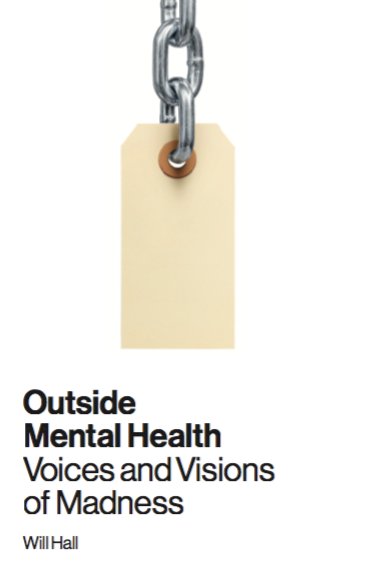Mad Science Mad Pride: Bradley Lewis
First Aired: 08-12-2009 -- 5 comments | Add comment

What is the mad movement’s best response to science? How is mad pride different from gay pride? Do we want to become equal with “normal” people — or challenge the idea of normal itself? What about suffering and the risk of romanticizing madness?
Icarus Project organizer, psychiatrist, and theorist Bradley Lewis, author of Moving Beyond Prozac, DSM, and the New Psychiatry: Birth of Postpsychiatry, discusses the identity politics of madness.
http://www.theicarusproject.net
http://www.nyu.edu/gallatin/about/bios/bradley_lewis.html
Podcast: Play in new window | Download (Duration: 56:59 — 52.2MB)
Subscribe: RSS



























 Creative Commons 2.5 copyright
Creative Commons 2.5 copyright
Best show of all! All these really, really cogent ideas. Thank you, Brad Lewis.
i thought the most interesting question posed in this awesome interview was by will when he talked about the difference between social movements dealing with madness and blackness/homosexuality
will was saying that people can just know at certain point in their life whether they are or are not gay; they just discover, somehow, that they are attracted to the same sex, and then they try to create a world in which their natural state can have space. will was saying, if i’m not wrong and this a question if will wants to clarify, that it seems madness, identifying as mentally different, is less felt inside to be a part of one’s true nature, more often something to move in and then out of. madness here would be something that is more temporary I guess than sexuality or race.
i guess this is just a question, and i don’t know if will responds to these posts…but what is the role of nature versus nurture, of innate qualities versus those given to people, and of movement through different identities, that is somehow different in race, sexuality, or madness? it seems that madness is more often connected to suffering, because people only step into zones where they get an official Insanity label when they or someone else says they are not well, but can’t mental difference be something that is often connected to suffering yet its own thing just like sexual difference or race?
i wonder to why it is that both race and sexuality are more often felt with total confidence to be a part of our true selves from birth to death, identities that we can’t move in and out of, whereas madness is less natural, more temporary, less felt at the core of our being…i think that our knowledge of the self involves both what we feel to be our true nature and the stories that we see ourselves fitting into that are given to us by our culture, but it seems with madness in particular that people are more polarized into thinking madness either is in our nature or its purely a result or nurture…maybe its like the broken bone thing and race and sexuality are just more visible or easier to find evidence for….
what an awesome segment, thanks to both, i wonder why i’ve felt that people look down upon discussions about “identity politics”
-mike
The more often i hear “Studies have shown this, studies have shown that,” the more I tend to think “Screw the studies, I’ve got my personal experience.”
Brad Lewis has a very important point when he says: “It too is a human product,” meaning science. To me it seems a human product just as religion. It’s just that science has replaced the Holy Spirit with the Holy Matter, so to speak. I think, the most important is to always remember that being human means being not perfect. What I see though is humanity worshipping the illusion of its own omnipotence and omniscience.
Concerning the suffering, I had the impression you were talking a bit past each other. But also I’m not sure whether there is suffering in crisis that goes beyond what is natural. Being human, being not perfect, also means suffering. If it’s called “mental illness” or not. Existential suffering is human. Only God doesn’t suffer… So, I’m not sure, whether the suffering should serve to limit MadPride from other movements of its kind.
Personally, I’d put a whole lot of my suffering down to my surroundings’ reaction to my suffering: if I see others fear me, I’ll fear me myself. Well, and to my own introjections of cultural norms: “This shouldn’t be.” The suffering actually de- respectively increased depending on whether I was met with understanding, and a fearless attitude of “This is perfectly natural”, or with fear, concern, etc. “Hell is other people,” as Sartre said.
You know what I love to hear? That a psychiatrist is a fan of the psychiatrized! It’s a great thought and a great feeling. I too am a fan of Will’s. What I got a great sense of in this broadcast was a feeling of equality; not identical but equal, which is something sadly missing in the relationship with mainstream psychiatry.
I must also say that “screw mainstream” sounds like a pretty good analysis to me. Of course, I am not as qualified to assess such things as Brad so I believe in this case, I will bow to ‘authority.’
There is a linguistics problem in the descriptions of madness that is unique to our group. What is “getting people access to the help they need” really meant to convey? A shiver runs down my spine when I read things like that. Is ‘the help I need’ going to be defined for me again by a third party? Or by a group consensus, no input from me, personally, necessary, or wanted, thank you?
The word ‘help’ means what the one using it thinks it means or what the one hearing it believes is being heard. We need to specify all these things in expansive, concrete terms to rid them of their well entrenched ambiguity.
The term ‘degradation ritual’ used to describe the psychiatric labelling process is right on target. I intend to add it to my own explanation process as I continue to indulge myself in the ‘writing behaviours’ I am using to feed my ‘obsession’ about being harmed by ‘others’ who can never be ‘blamed’ for anything which I refuse to ‘let go…let it go…’ like a good compliant genetic defective with normal respect for ‘authority’ (in the abstract) SHOULD. You would think I would be grateful and smile more and yet I don’t. Those who want to save me cannot understand why…must be the brain chemistry thing…otherwise, it might be a hearing problem.
Often people who have a crisis or extreme state want very much to get rid of this part of themselves. Unlike being queer or a minority race or nationality. Some of us separate the suffering side from the difference side – so for me for example, yes I want to be in less pain and less suicidal, but I don’t want to give up or get rid of the trance and altered states associated with that for me, because I value positive aspects of those altered states. I may want to be healthier and happier with my life but I don’t want to change who I am in terms of my states of consciousness and difference. Psychiatry puts all of that together as a disorder. On the other side are people who don’t identify with any mental difference and their bipolar or schizophrenia was imposed on them as an identity for all kinds of arbitrary reasons – wrong place wrong time for example (often people become psychotic because of specific stressors they need to just learn to avoid, or they grow out of their vulnerability to those stressors, but their hospitalization imposes a lifelong disorder identity). Then there are those who suffer states of consciousness and just want to get rid of or heal/recover from them.
One way to look at it is this– if I lived in a totally different culture with no
psychiatry — ie most cultures– what would I want to change and what would I want to live with. What gets called catatonia here is seen as sainthood elsewhere.
These questions are very different than those faced by someone affirming their black
or gay identity against institutional oppression. Is there a core mad or different self before psychiatry? Someone who stays up for days talking nonstop then collapses- manic or artist? How do we affirm difference and reject pathologization?
Everyone with a psych label has a unique approach to identifying themselves. The comparison of mad pride to gay or black pride holds in some ways. But mad pride is partly a result of madness constructed and imposed by institutional authority to eradicate difference. For some activists it feels useful to reclaim madness as an identity like other identity politics, for some that feels self-defeating and self-imposing of limitation. – Will